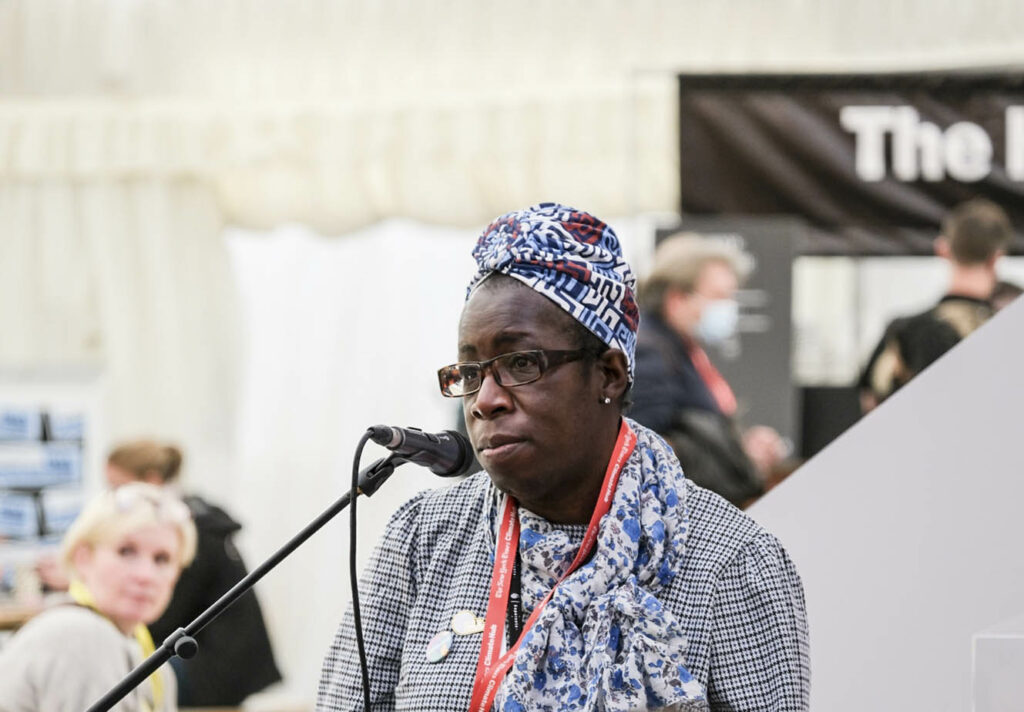Politicians out of touch: Xoli Fuyani, a mother and co-director of the African Climate Alliance, decided to attend the United Nations Climate Conference in Scotland to ensure the voices of marginalised people are heard. She joined a delegation of mothers’ organisations led by Rosamund Adoo Kissi Debrah
Xoli Fuyani didn’t intend to attend the COP26 climate summit in Glasgow, Scotland. “It’s a big PR show,” said the environmental teacher in Khayelitsha. “The decisions have already been made … Big politicians have no clue what is happening on the ground.”
But, after thinking about it, Fuyani realised that many voices are “often excluded” at global climate negotiations. “These are the communities who are already experiencing the effects of climate change, whose lives are being deprived, whose children are already living the future that we all are fearing.
“When the policymakers sit at their tables, they [should] reflect how this climate crisis is really an emergency that needs to be dealt with now, not in 10 years. There’s not a lot of spaces where you get to hear stories of children from eMalahleni who are struggling to breathe at this moment, whose parents are having to leave their jobs to take care of them, which then adds more to the high unemployment rate and the poverty in our country.”
On 5 November, Fuyani, the co-director of the African Climate Alliance, was among mothers from the United Kingdom, Brazil, India, Poland and Nigeria who sent a letter to heads of state, delegates and COP26 president Alok Sharma, demanding an end to fossil fuel financing. The letter represents one of the biggest mobilisations of parents on any issue, the organisers said.
The delegation was led by Rosamund Adoo Kissi Debrah, who became a clean air advocate after her nine-year-old daughter, Ella, died in 2013 from a rare, severe form of asthma. Ella is the first person in the UK, and possibly the world, to have air pollution listed as a cause of death on her death certificate.
“We are millions of parents from all around the world, writing on behalf of the children we love,” reads the letter. “We demand that you end financing for all new fossil fuels now.
“Our children are being poisoned by toxic pollution from burning fossil fuels with every breath they take.
“That burning is also the key driver of the climate crisis, which is ruining our children’s futures.”
Air pollution from fossil fuel combustion and bush and wildfire smoke, worsened by the climate crisis, “lodges inside our children’s bodies, stunting the development of their lungs, brains and hearts. It causes and aggravates chronic diseases from asthma to cancer. Babies are poisoned before they’re born with soot breathed in by expectant mothers, which crosses the placental barrier and increases the chance of premature birth.”
The letter highlighted how one billion children are facing extremely high risks of immediate harm from the devastating effects of the climate crisis. “Children of colour and in marginalised communities are the worst affected … If the decisions your governments make at COP26 and beyond do not prioritise immediate and rapid emissions cuts from all fossil fuels — coal, oil, and gas — the damage to our children’s health and our climate will get far worse with terrifying speed.
“The Intergovernmental Panel on Climate Change has made this very clear. There are already more than enough fossil fuels discovered to dangerously heat our planet beyond 1.5°C and keep poisoning our children’s air.”
As mothers, “we make decisions every day for our children’s long-term future, and here at COP26, so do you.”
 Rosamund Adoo Kissi Debrah
Rosamund Adoo Kissi Debrah
The letter is a joint effort by two global networks, Parents For Future Global and Our Kids’ Climate — of which Fuyani is a member — alongside Moms Clean Air Force in the US, Warrior Moms in India, Mums For Lungs and the Ella Roberta Family Foundation in the UK, and hundreds of other parent groups.
Air pollution, the World Health Organisation said, is one of the biggest environmental threats to human health, alongside climate change, and causes seven million premature deaths each year. According to the State of Global Air 2020 report, nearly 500 000 infant deaths in the first month of life are attributable to air pollution.
South Africa’s coal industry, Fuyani said, is the world’s fifth largest and employs 90 000 people, generating 80% of the country’s electricity.
“South Africa is the biggest polluter on the continent. Even though we know that we’re a big contributor to climate change, our government has still proposed new 1 500MW coal-powered electricity. Again, that will cause a lot of destruction mostly in marginalised communities … When you start a coal mine next to a community, you compromise lives.”
Fuyani said environmental destruction, resource depletion, pollution and climate breakdown are human rights issues. “In my work, I get to see how people every day really struggle for basic human rights needs. I have kids in my programme that travel more than 2km to get clean water and sanitation.”
At COP26, she and other parents attended the Fridays for Future action for youth day, an air pollution “die-in” and a Global Day of Action march as part of the parents bloc.
“As much as young people are taking to the streets calling for action on climate change, it’s really time for us as adults to come together, to take over from the young people and stand up and act,” said Fuyani.